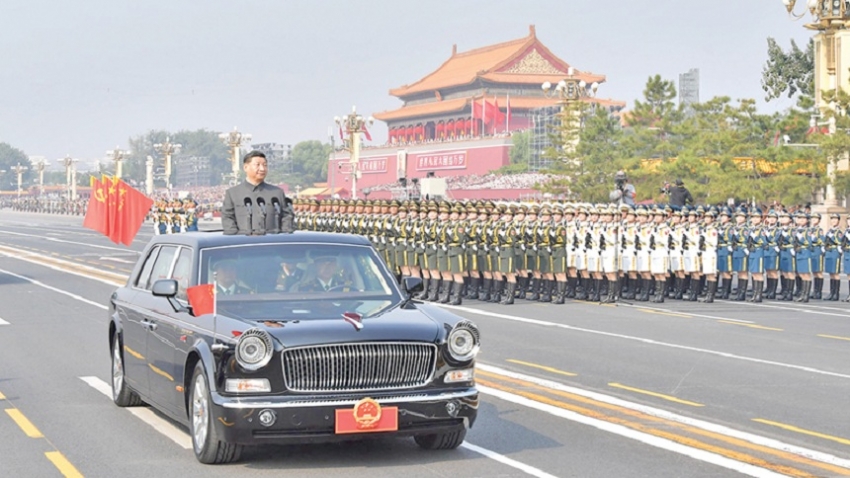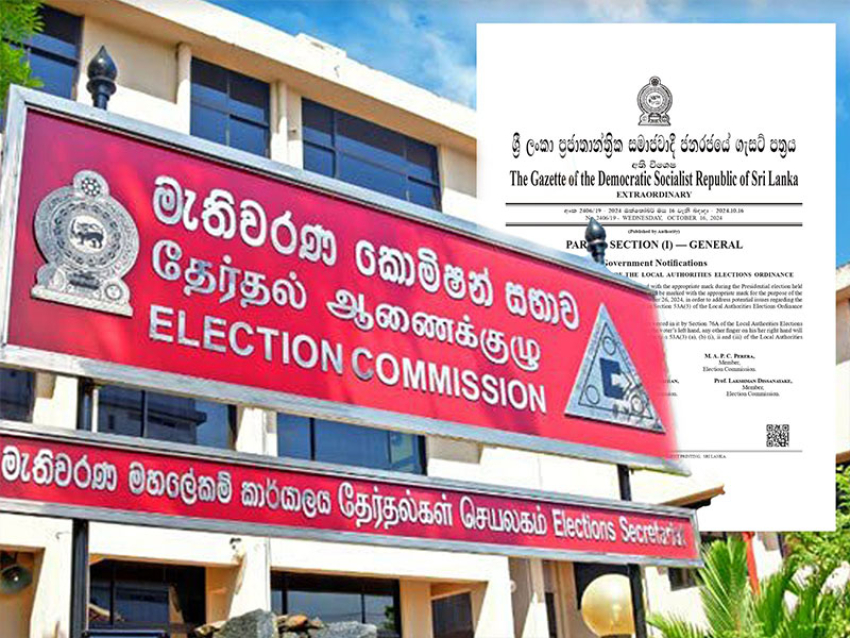The 70th anniversary of the founding of the People’s Republic of China was celebrated this week with events throughout China, where the highlight was the massive military parade in Beijing, seen as one of the biggest military displays in the world. The nationwide celebrations were marred by the continuing protests in Hong Kong, where there was increased violence by the pro-democracy activists in the 17th week of continuing protests.
The celebrations that saw 70 years of Communist Party rule in China launched by the founder Mao Zedong, and its rise to a global superpower status today; with the military parade showcasing the country’s rising technology and economic strength, moving far away from the harsh times of its founding.
China’s leadership, past and present, gathered on a viewing platform over Tiananmen Square on Tuesday to watch the military parade of 15,000 troops and weapons including new hypersonic drones and intercontinental ballistic missiles. President Xi Jinping said “There is no force that can shake the status of this great nation. No force can stop the Chinese people and the Chinese nation forging ahead.” In keeping with tradition, he wore a grey Mao suit and watched the parade from the same spot where Mao stood to announce the establishment of the People’s Republic of China on October 1, 1949.
The massive military parade displayed a new-generation intercontinental ballistic missile capable of striking in the United States, as well as stealth combat drones and fighter jets, considered the most modern and powerful today’s military material. The military parade was followed by a civilian parade, featuring tributes to national icons from founding leader Mao Zedong, and the bicycles China was known for before it became an economic juggernaut, that have sprung up since the reforms of the 1980s.
The huge and modern military display was in sharp contrast to the China that was so poor and battered by civil war at the time of founding in 1949, that some of its 17 warplanes in the original founding military parade, were reportedly ordered to fly by twice, to make the air force seem larger than it was.
These anniversary celebrations came as Beijing faces its most serious challenges since the 40th national day in 1989, months after the military killed pro-democracy protesters in and around Tiananmen, plunging China into international isolation. But the pro-democracy movement has now emerged with continuing strength in Hong Kong, where months of protests against Beijing policies have shown widespread opposition to the Communist vision for China, of economic prosperity without political freedoms. President Xi in his speech promised to “maintain the long-term prosperity and stability” of Hong Kong, and said the government was committed to the political template which gives the city limited autonomy, ‘one country, two systems’.
The protests in Hong Kong on Tuesday saw a defiant “Day of Grief” and fresh clashes with the police as pro-democracy activists ignored a ban on marches. There were many clashes with the police, with protesters throwing Molotov cocktails causing fires, attacking official premises and the police who widely used tear gas, water cannon and rubber bullets. There was a major heightening to these protests when one protesting youth was shot by a live bullet by a policeman, who was closely threatened by the attacker. This is the first use of a live bullet in these protests, leading to new protests in Hong Kong, continuing the political crisis facing the Chinese leadership in Beijing.
As China marks the 70th anniversary of Communist rule, the current trade war with the US threatens both the American and Chinese economies, with growing international unease at the growth of Chinese power beyond its borders. In addition to unrest in Hong Kong, there is also growing support for anti-Beijing politicians in Taiwan – the self-ruled island claimed by China, since the fall of the Kuomintang in the battles with Mao Zedong’s Communist forces.
US – Trump impeachment
Politics in the United States is in a situation of a major conflict over the move by the Democratic Party in the House of Representatives to impeach President Donald Trump, over his July 25 phone call with the Ukrainian President Volodymyr Zelensky.
The transcript of the phone call, released by the White House itself, shows that President Trump did ask the Ukrainian President for help about allegations of corruption involving former US Vice President Joe Biden, and his son, who was employed in an Ukrainian company dealing with gas supplies. The issue is serious because Joe Biden is currently the leading Democrat opponent to President Trump in the 2020 presidential election.
With the Democrat Speaker of the House of Representatives, Nancy Pelosi, moving for an impeachment process against him, President Trump is moving with rage against the Democrats and those supporting the Whistleblower’s complaint about the controversial phone call.
President Trump has told the Press “This is the greatest hoax. This is just a continuation of what's been playing out since my election,” and “This is a fraudulent crime on the American people.” He has lashed out against journalists reporting on the impeachment move against him, and said that he was changing his description of “fake media” to that of “corrupt media”.
Intelligence Chairman Adam Schiff has become the key subject of Trump's ire, as he warned against potential witness intimidation or “incitement to violence” by opponents of the impeachment.
Adam Schiff has said obstruction of justice could be added to any articles of impeachment, concerning statements by Secretary of State, Mike Pompeo against moved to issue subpoenas to State Department officials for the impeachment inquiry. Pompeo himself has now admitted he was present at the time of the controversial phone call, which he denied earlier.
Trump has said that Adam Schiff should be looked at for ‘treason’ for dramatizing a version of the Ukraine calls. He said: “It should be criminal. It should be treasonous. He made it up; every word of it, made up,” Trump said this seated next to the visiting Finnish President, who was on an official visit to the White House.
As the impeachment move proceeds, the Secretary of State Mike Pompeo and Trump’s private lawyer Rudy Giuliani is expected to be subpoenaed for evidence.
Meanwhile, public support for the impeachment process is increasing, with the Americans who believe Trump should be impeached rising by eight percentage points this week, as more news of the allegations is available, with the September 26-30 opinion poll finding that 45% of adults believe Trump “should be impeached,” compared with 37% in a similar poll the previous week.
However, there is very little support for the impeachment among Republican members of the US Senate, which is the legal jury in the impeachment process. A two-thirds majority of Senators is needed to carry an impeachment to success. Pro-Trump Republicans are a clear majority in the US Senate today. Trump’s angry politics is aimed at keeping the pro-Trump public in key states not moving to support the impeachment.
Johnson plan on Brexit
UK Prime Minister Boris Johnson has sent proposals to the European Union on the UK’s exit from the EU – which he says is a genuine attempt to bridge the chasm to get a fresh Brexit deal with the EU, but with the unstated goal of a general election in the UK.
The controversial move, where Northern Ireland would stay in the EU single market but leave the Customs Union, is his compromise move, against the earlier Back Stop or no Customs checks on the Irish border with the UK.
Irish PM Leo Varadkar has said the new plans were welcome, but “fall short in several aspects”.
The UK Labour and Opposition Leader Jeremy Corbyn criticized the “unrealistic and damaging proposals”.
Meanwhile, the European Commission said there were “problematic points” in the UK's proposal and “further work is needed”. Political analysts see Boris Johnson’s delayed move as one that seeks the possibility of a “No Deal” exit from the EU by October 31 this year. The House of Commons has already passed a law that is against a “No Deal” and requires Johnson to seek an extension from the EU if no agreement is reached, and approved by the House of Commons by October 19. The current developments see this goal unacceptable by Johnson. However, he has got the support of the Northern Ireland's Democratic Unionist Party (DUP) and some Labour MPs too supportive of this move.
Boris Johnson’s real goal is to move to a general election in the UK, where present indications are that the Conservatives led by him could get a majority of the public vote.
Afghanistan polls
Voter turnout in the first round of Afghanistan’s presidential election on Saturday may have been as low as 20%, according to preliminary counts, amid threats from the Taliban to attack polling stations, the lowest since the 2001 US-led invasion in the country; a steep decline of approx 60% of eligible voters from the 2004 polls.
The militant group Taliban, which holds more territory today than at any point since it was ousted in 2001, denounced the elections as illegitimate and warned that polling stations would be targeted. In response, the authorities deployed more than 70,000 police, troops and intelligence officials to secure polling stations and lockdown major cities.
Gandhi ashes stolen
As India marks the 150th anniversary of Mahatma Gandhi’s birth, and there was the shocking news of the ashes of the Mahatma stolen from a memorial centre in Madhya Pradesh in India, where they were kept since the 1948 assassination of the Mahatma by a Hindu extremist. The thieves had also scrawled “traitor” in green paint across photographs of Gandhi, the Indian independence leader.
Some Hindu hardliners view Gandhi as a traitor for his advocacy of Hindu-Muslim unity, despite Gandhi being a devout Hindu himself. After his death, he was cremated, but his ashes were not scattered in a river, in accordance with Hindu belief. Because of his fame, some ashes were held back and sent around the country to various memorials - including the one in the Bapu Bhawan, in Madhya Pradesh. The theft shows the strong anti-Muslim feelings among sections of the Hindu majority in India.
Police are reportedly taking action on the theft after a leader of the local Congress political party filed a complaint.



















